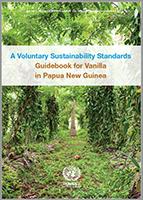
This report offers an overview of Voluntary Sustainability Standards and their potential impact on the vanilla industry in Papua New Guinea.
Voluntary Sustainability Standards, encompassing certifications and standards for sustainable commodity production, can contribute to the promotion of sustainable practices and enhance market access, potentially boosting profits and incomes, especially for farmers.
The initial section of the report focuses on vanilla as a commodity, discussing the various types cultivated globally, their quality standards, trade flows, and the market’s volatility.
It then introduces Voluntary Sustainability Standards, exploring their significance and potential benefits not only to the vanilla industry but also to the broader agricultural sector.
This section emphasizes the growing influence of health-conscious, environmentally and socially aware consumers worldwide, alongside governments’ increasing incorporation of sustainability into legislation. These developments necessitate adaptation by farmers and others in the vanilla value chain.
Further, the report provides an overview of Papua New Guinea’s vanilla sector and its value chain, highlighting how VSS pose both challenges and opportunities.
The final section offers recommendations for the government and private sector to enhance the competitiveness, attractiveness, and sustainability of Papua New Guinea’s vanilla industry.
It emphasizes the role of smallholder farmers, underscoring that strengthening the sector can lead to more inclusive growth.
The report is part of the project “Green trade for sustainable development in Pacific small island developing States of the Melanesian Spearhead Group (MSG)”.
The project was financed through the United Nations Development Account (12th Tranche) and implemented by UNCTAD jointly with the MSG Secretariat.
The objective of the Project is to identify and strengthen synergistic linkages between green trade promotion and the Sustainable Development Strategies (SDS) of MSG member States – Fiji, Papua New Guinea, Solomon Islands and Vanuatu – in a regionally collaborative manner.


